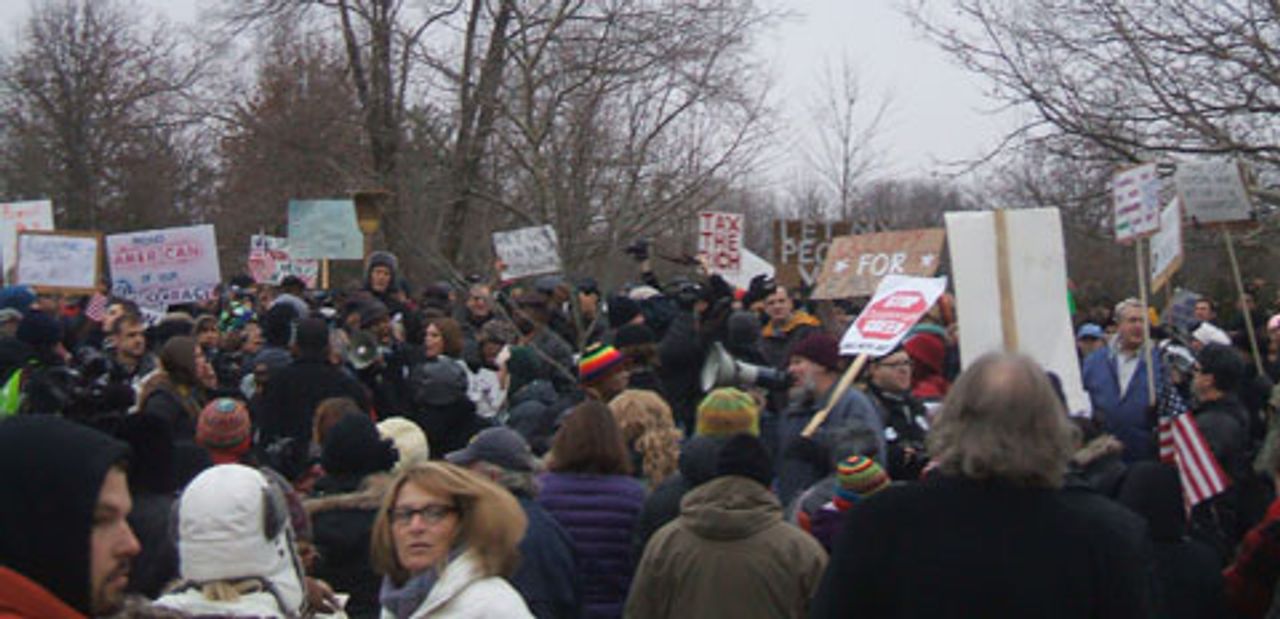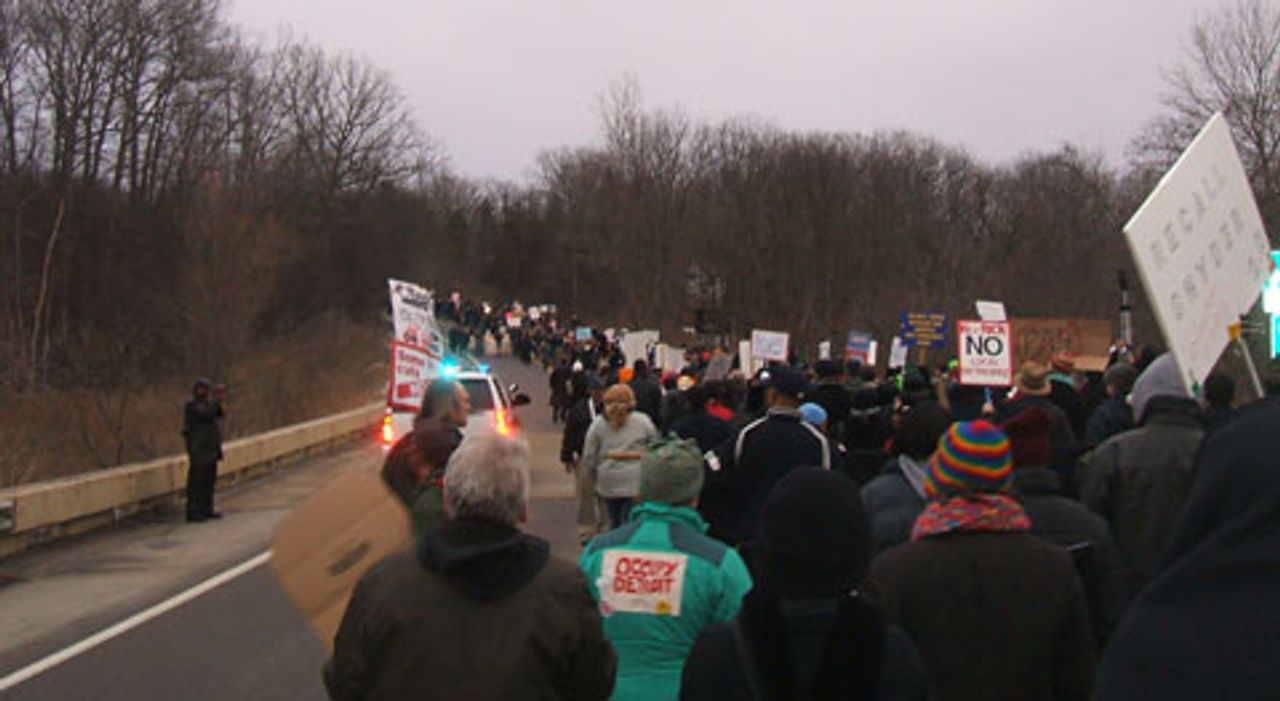Local Democrats and pro-Democratic Party organizations staged a rally in Ann Arbor, Michigan on Martin Luther King, Jr. Day, January 16, to oppose the Emergency Manager (EM) law passed by Republican Governor Rick Snyder.
 The rally in Ann Arbor
The rally in Ann ArborThe demonstration at Snyder’s home was a continuation of efforts to divert popular opposition to the attack on the working class behind political forces that are no less committed to this attack than Snyder himself.
Snyder has threatened to name an EM to run Detroit, as has been done in four other Michigan municipalities. The EM would be given essentially dictatorial powers to abrogate contracts, enforce pay cuts, sell off city assets and take other measures to resolve the city’s budget deficit on the backs of those least able to afford it. A final decision will come after the recommendation of a financial review team due at the end of February.
Last week’s demonstration was staged by a coalition comprised of a section of the affluent Democratic Party elite, the trade union bureaucracy and middle class pseudo-left organizations. The protest had the support of the self-proclaimed civil rights leaders and millionaires, Al Sharpton and Jesse Jackson. The media, amplifying the event’s size and significance, sent three news helicopters and half a dozen trucks to broadcast via local radio, TV and print.
In circulating petitions that would reverse the EM law, these groups have attempted to present it primarily as a matter of “white” Lansing seeking to establish greater control over Detroit, with its majority African American population. The use of racial politics is aimed at obscuring the fundamental class issues involved, while diverting attention from the fact that the Democratic Party is itself divided over the EM law, does not oppose its anti-democratic content, and, above all, supports all the cuts that the EM law is intended to address.
 The march in Ann Arbor
The march in Ann ArborDetroit Mayor David Bing now claims to oppose the naming of an emergency manager in Detroit. This is a reversal of his previous position, when he was jockeying to be named the manager himself. City Council President Pro Tem Gary Brown openly supports the law, and two of the four EMs that have taken over city governments are Democrats.
These divisions were reflected in the tepid remarks of the rally’s speakers. Little was said before the march. At the end, Rev. Charles Williams II plaintively said to Snyder’s representative, “We elect mayors, we elect city council members and we would like them to be a part of the process… in terms of rebuilding these urban cities.
“We don’t want our elected officials to be unilaterally dismissed. That’s the message that we’re sending here today. We ask that you would let the governor know,” he concluded. With that, the crowd of a few hundred dispersed.
Williams himself has stated that he supports the legal notion of an EM “under certain conditions.”
“I do think that emergency financial management, in a more democratic sense, could be a savior for struggling cities,” Williams has said. “I can’t say that Public Act 4 [the EM law passed by Snyder] is good, but some changes to Public Act 4 could be a benefit. If I was to change it, the emergency manager would have to work with the city’s electorate. Take out the part where they can dump elected officials.”
That is, the local Democratic Party officials would like to ensure that they are involved in enforcing the attack on workers, and that the various prerogatives and perks that come with their control over the city administration not be upended.
Neither Sharpton nor Jackson attended the demonstration, nor did US Congressman John Conyers, who had come to Detroit to build for the rally. Other supporters of the rally were the NAACP, American Federation of State, County and Municipal Employees (AFSCME) and the UAW.
They were joined by representatives of Occupy Detroit and a host of middle class organizations that operate on the periphery of the Democratic Party, such as the Workers World Party and By Any Means Necessary (BAMN). These organizations also have a financial stake in the local city administration and in the unions. They play the role of “left” cover for the Democratic Party.
While staging the event for public consumption, the organizers are simultaneously working behind the scenes with Governor Snyder and the Detroit City Council to force through massive cuts in jobs and benefits against city workers.
The local Democratic Party officials and the unions are involved in discussions with Andy Dillon, Snyder’s treasurer and a Democrat, to reach a “consent agreement” rather than have an emergency manager appointed. This would give the City Council and the Mayor many though not all of the powers associated with the EM. Snyder has repeatedly said he would prefer not appointing an EM to Detroit, and Dillon has gone out of his way to give city officials time to work out an agreement.
AFSCME Council 25, which has been the main force behind the anti-EM petition campaign, has already agreed to more than $100 million in concessions this year and $258 million in 2012-13. Bing has called for 1,000 layoffs, a 10 percent wage cut, and major cuts in benefits. The City Council wants more, calling for 2,300 layoffs including 200 firefighters, which would be close to half of the fire force.
There is enormous opposition in Detroit to the cuts being proposed by the Bing and Snyder administrations. However, this sentiment finds no expression in the Democratic Party, the trade unions, or their various adjuncts.
